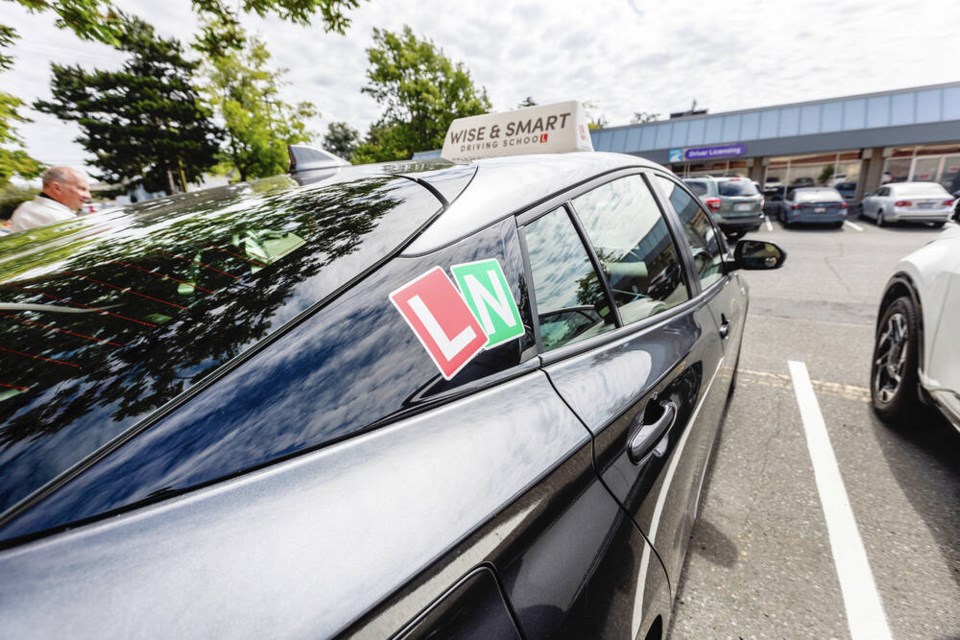Road-test evaluation times for new drivers are being shortened by 10 minutes, the government announced last week. The road test will now last just 35 minutes.
The claim is that there is a huge backlog in road tests, post COVID, and this move is aimed to increase examiner capacity by 22 per cent.
I don’t think 10 minutes will make a big difference, especially as officials feel that redundancies in the current test will be reduced or eliminated.
The more concerning news to me is that, according to ICBC’s stats, 50% of learners are failing their road test — and that’s an improvement from previous years. Having to continually repeat the road test is surely part of the answer as to why the test system is overburdened.
But this also shows that the system is working and that no one is putting an unqualified driver through with a wink and a nod.
But why are so many people failing?
The short answer is a lack of preparedness.
The driving test is the end of a deliberately long process to qualify drivers, particularly young people, for an ever more demanding road environment.
Clearly with these failure numbers, there’s no free pass, so steady and consistent preparation are the keys.
Officials note that many young test takers are very nervous. That’s understandable — it’s a big deal. But there are several things you can do to make it through.
The most important advice I can give is to take professional driving lessons. Driving schools employ experienced knowledgeable staff, most of whom have been driving for decades.
Many young drivers suffer from a common problem: They don’t know what they don’t know, and oftentimes their parents don’t know it either.
Parents can play a vital role in enabling practice but in establishing those basic road skills, you’re way ahead with professional lessons.
Next, the most important thing a learner can do is practise, practise, practise. If you want to nail that road test the first time, your log book should be full.
No one walks onto an Olympic or professional sport team by reading a manual, then trying the sport for several months. It takes years of dedication, coaching and (again) practise to achieve these highest levels.
Now, of course, learning to drive doesn’t take an Olympic-level regimen but it requires concentration and commitment beyond your daily routine.
That includes knowing your vehicle. Take 10 minutes and learn what all the doodads are for. Learn how to move the seat, mirrors, steering wheel, and other controls. Know where the registration is kept. Is your car actually licensed and insured? Do all the lights and signals work? The examiner will be checking.
Practise in different situations. Driving around the same five blocks builds false confidence and won’t prepare you for the unfamiliar because the unfamiliar happens every day on the road.
Learn how to back up safely. There are mature drivers out there today who can’t parallel park or back out of a routine situation. Learners often fail their test on the very last required manoeuvre — backing into a parking stall. Your practice time should include lots of safe reversing.
Follow the rules of the road. Even though you obtained your learners licence, read the manual again before the road test. Challenge yourself to be perfect. Obey the speed limit, always signal, stop at red lights and stop signs, yield to pedestrians.
Be aware of your surroundings by following the number one awareness rule: Keep your eyes on the road. Constantly scan, check your mirrors frequently and keep back from the car in front.
If you can’t take lessons, ask an adult family friend to take you out before the test. Ask for candid feedback which a parent, for the sake of family peace, might not want to give.
Listen to constructive criticism. Often, new drivers concentrate on a difficult manoeuvre and forget the smaller things like signalling or shoulder- checking. Hearing the feedback and correcting small errors can be the difference between a pass or fail.
You will overcome that nervousness which driver examiners are seeing during road tests by listening to instruction, thoroughly knowing the rules and practising consistently.
Glove Box: This year, a woman in Nova Scotia was pulled over for driving with a live lobster in her car. Apparently, she was taking the crustacean to a friend’s house for dinner and did not have a cooler to put it in. She believed it was legal to drive with a lobster, as long as it was not in distress. Is there a rule for driving with a distressed lobster? The police officer let her go with a warning, but not before taking a selfie with the lobster.
>>> To comment on this article, write a letter to the editor: [email protected]



